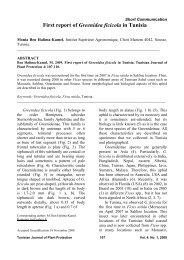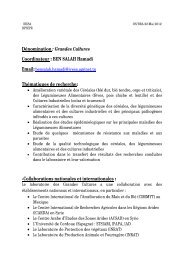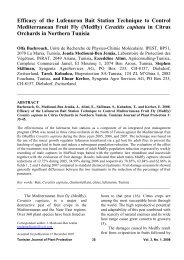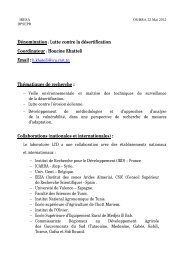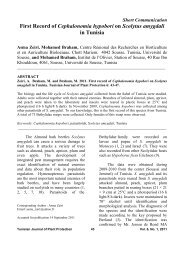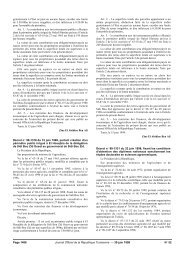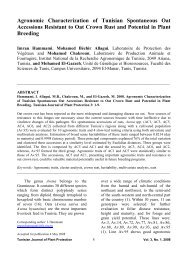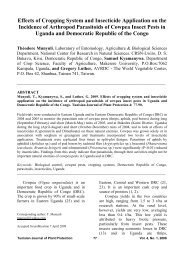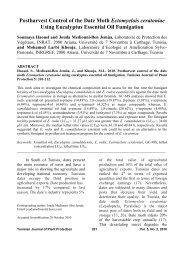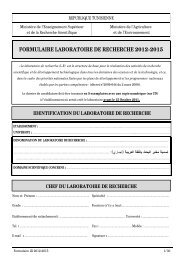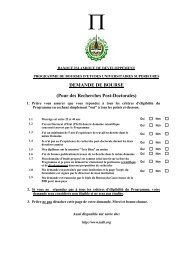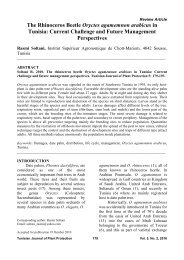Tunisian Journal of Plant Protection Vol. 8, No. 1, 2013 - Iresa
Tunisian Journal of Plant Protection Vol. 8, No. 1, 2013 - Iresa
Tunisian Journal of Plant Protection Vol. 8, No. 1, 2013 - Iresa
- No tags were found...
Create successful ePaper yourself
Turn your PDF publications into a flip-book with our unique Google optimized e-Paper software.
farmers and innovative research isconsidered as a key element thatcontributes to the successful development<strong>of</strong> the organic sector.The plenary sessions continuedwith presentations on the current situation<strong>of</strong> organic agriculture in Tunisia, anoverview <strong>of</strong> the research activities <strong>of</strong> theMediterranean Agricultural Institute <strong>of</strong>Bari (IAMB) and an outline on currentresearch on microbial control <strong>of</strong> insects inTunisia.Further, sessions included insectand disease management with a strongfocus on microbial control and botanicals.Fortunately the list <strong>of</strong> speakers includedmany young researchers, which weregiven the opportunity to present theirresults on a conference. Fortunately, aconsiderable proportion <strong>of</strong> the youngspeakers presented high quality work.Two <strong>of</strong> them were rewarded at the end <strong>of</strong>the conference for the best oralpresentation and the best posterpresented.Another positive aspect related tothe contents was the considerable amount<strong>of</strong> contributions on basic research onpests and diseases. This type <strong>of</strong> research,e.g. on the auxiliary fauna is generallywork intensive and not easy to publish.On the other hand, this type <strong>of</strong> study is animportant part <strong>of</strong> any research agenda inorganic agriculture, which is mainlyfocusing on understanding the systemsand on the principle <strong>of</strong> prevention.Some <strong>of</strong> the approaches presentedhowever may cause problems with theself conception <strong>of</strong> organic agriculture oreven with the general legislation. The use<strong>of</strong> mycotoxin producing fungi such asAspergillus flavus, for example, is anambivalent approach for organic systems.Summaries <strong>of</strong> all contributionshave been compiled in an abstract bookthat is available via the website <strong>of</strong>ISOFAR. The last day <strong>of</strong> the Symposiumwas dedicated to an excursion which wasfocusing on citriculture and horticulturecompleted by interesting cultural visits.This symposium <strong>of</strong>fered a greatopportunity for all participants to shareinformation and experiences about cropprotection and Organic Agriculture underMediterranean conditions.The atmosphere during thesymposium was more than convenient.Foreign participants had the great chanceto enjoy the hospitality <strong>of</strong> the <strong>Tunisian</strong>hosts. The Organizing and ScientificCommittees deserve full gratitude.Dr. Mohamed Ben KhédherFor the Organizing and Scientific Committees-------------------<strong>Tunisian</strong> <strong>Journal</strong> <strong>of</strong> <strong>Plant</strong> <strong>Protection</strong> <strong>Vol</strong>. 8, <strong>No</strong>. 1, <strong>2013</strong>



